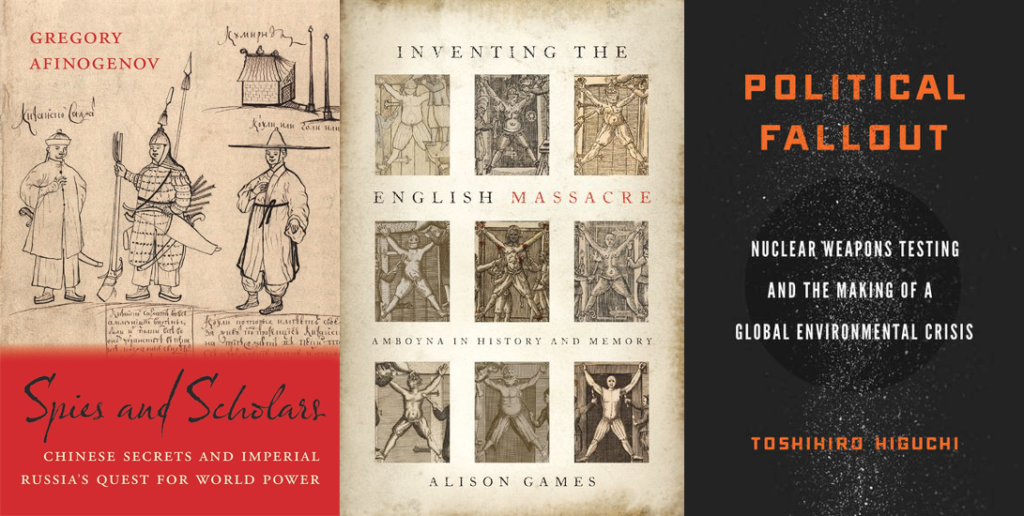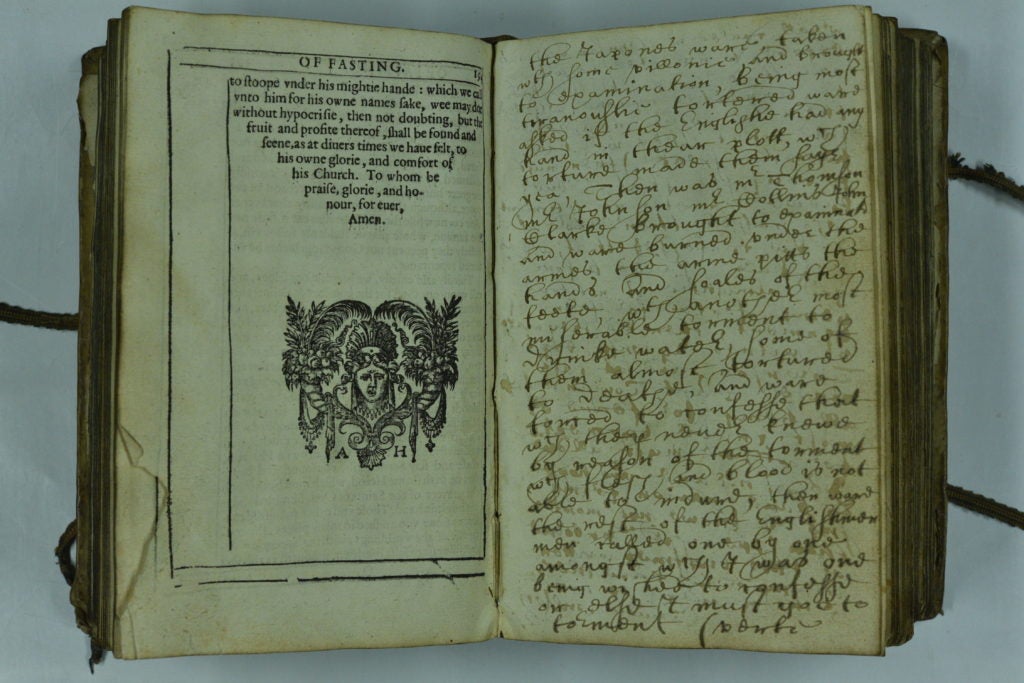Scandals, Scholars, Scientists: Three Books from Georgetown History
Georgetown History is proud to note that we had three faculty publications released in quick succession back in Spring: Professor Gregory Afinogenov’s Spies and Scholars: Chinese Secrets and Imperial Russia’s Quest for World Power (winner of Harvard University Press’s 2019 Thomas J. Wilson Memorial Prize(, Professor Alison Games’ Inventing the English Massacre: Amboyna in History and Memory, and Professor Toshihiro Higuchi’s Political Fallout: Nuclear Weapons Testing and the Making of a Global Environmental Crisis. To commemorate these achievements, we talked with the authors to explore how these books came to be.

A Brief Introduction
Here’s how the authors describe their recent books:
Gregory Afinogenov, Spies and Scholars: “The book examines how Russians created knowledge about China between the seventeenth and mid-nineteenth centuries, and how the forms and purposes of that knowledge shifted over time as the Russian Empire’s place in the world changed.”
Alison Games, Inventing the English Massacre: “Massacres – the mass slaughter of people – might seem as old as time, but the word itself is not. It worked its way into the English language in the late sixteenth century. How that happened is the story of a place called Amboyna. My book tells the story of the long history of the Amboyna episode and along the way explains how the incident became a massacre, and why that matters.”
Toshihiro Higuchi, Political Fallout: “My book tells a story of one of the first human-driven, truly global environmental crises in history. My main argument is that the Cold War not only escalated atmospheric nuclear testing but also ultimately helped to mitigate its radiological consequences by driving the politics of risk in an unexpected direction.”
What’s in a Name?
As Professor Games emphatically asserts: “Everything is in a title!” A book title is often a person’s first encounter with a book, and it’s thus extremely important that the title be both descriptive and eye-catching, unique and informative. Despite each of the books’ titles consisting of a baker’s dozen words or fewer, all of the authors commented on the importance – and occasional difficulty – of choosing what makes it onto a book’s cover:
Afinogenov got the inspiration for his book’s title from an unlikely source: a song called “Saints and Scholars” by the 80s post-punk Irish band Big Sleep. However, the subtitle of the book was a bit more complicated; it required a “literally months-long negotiation” with the book’s editor, Kathleen McDermott, to make sure that it was clear and concise enough while also giving potential readers enough to go on. As Afinogenov reflects, “Title-making is a collective endeavor, it turns out.”
The title of Higuchi’s book too was a collaborative effort. His first title was deemed too “dissertation-ish,” and the publication house’s editor-in-chief suggested “Political Fallout.” Initially, Higuchi was worried that it might downplay the issue and argument of the book being solely a game of “political football”, but his fears were assuaged when it got a positive reaction from fellow Georgetown History Professor Adam Rothman – “a master of catchy and creative book titles,” in Higuchi’s words.
Whereas the aforementioned texts are Afinogenov’s and Higuchi’s first books, Making the English Massacre was by no means Games’ first literary rodeo. The title reflects her argument that the Amboyna Massacre is inextricably linked with the English language’s concept of the word ‘massacre’ itself: that the “Amboyna episode gave the word a different kind of meaning.” With this idea, augmented by purposeful artistic choices for the book’s cover intended to “show and reinforce” her argument, Games has demonstrated that a book can do a lot of work even before a single page is turned!
Hidden Gems
Of course, while a title is extremely important, it is the research and explanation that makes up the ‘meat’ of any work of History. Each of the authors tracks intercontinental developments, utilizing a variety of sources from Asia, Europe, and elsewhere to parse out the interactions that happen between – physically, culturally, and diplomatically – empires.
In Making the English Massacre, Games makes heavy use of manuscripts from the English East India Company, including rarer factory records from the island of Java. However, because the Amboyna Massacre occupied such an important space in the collective English memory of the seventeenth century and beyond, she also was able to make use of printed books and visual materials, including pamphlets produced about the incident by the East India Company itself. However, Games’ favorite source was centered in her attempt to reconstruct the conspiracy trial surrounding Amboyna, a task made difficult by the contradictions and inconsistencies of the deponents: one of the English traders, Samuel Coulson, wrote in the blank pages of a Book of Psalms proclaiming his innocence and that he and the other conspirators had been tortured by the Dutch into confess to crimes they did not commit. The book eventually made its way back to England, King Charles I ordered that it be submitted as evidence in the Dutch trial held by the States General in The Hague, where it remains to this day.

Psalms of David in Meeter (Edinburgh, 1611). National Archives, The Hague, States General,
1.01.02, inv. no. 12581.15.
For Higuchi, the biggest challenge was navigating the “thick shroud of secrecy” that surrounds states’ nuclear affairs. Despite the book being published nearly 50 years after the Partial Test Ban Treaty and nearly 30 years after the end of the Cold War, much information about nuclear weapons remains inaccessible. However, thanks to public controversy over fallout and its adverse effects both on human health and the environment, Higuchi believes that his topic “happens to be the least secretive part” of nuclear policy and research. Looking back at the response to nuclear fallout in the Soviet Union, United States, and Japan, Higuchi sought to integrate the transnational interactions of the scientists and policymakers instead of “dividing the narrative along national lines.” In one case, the reports of the Japanese delegation to the United Nations Scientific Committee (UNSC) provided insight into deliberations that never made it into American cables, and, in another case – Higuchi’s favorite – Japanese scientists pointed out culturally-biased methods of determining fallout’s effect on human health: Western members of the UNSC proposed investigating milk and dairy products, but the Japanese found that rice, a staple crop in Asia, was much more contaminated, declaring that they had worked closely with their counterparts in India “as the same rice eaters” to confront the “milk-drinking” Westerners!
For Afinogenov, one might assume that there would be a similar amount of secrecy regarding archives centered on espionage, but it turns out that there was an even larger obstacle to doing that research: reconstruction. The main repository was undergoing renovation, so Afinogenov was forced to fill in the blank at other archives, in Russia, France, and the United Kingdom. Despite the difficulty, however, he was able to find quite a few interesting stories of skullduggery and espionage, including his favorite example, wherein a Hungarian convict in Kamchatka forged a Russian document, fled to Macao, and then turned it over to the French government in hopes of gaining a position with them. In this case, having to travel to different archives around Europe, allowed Afinogenov to “see how the textual culture of eighteenth-century intelligence took shape” as France came to fear – thanks to this crafty Hungarian escapee – a join Russo-British invasion of China.
Looking Forward, Looking Back
They say that hindsight is 20/20, so now the authors reflect on the projects that took years of preparation and process that led to their creation and release. And, of course, we must also look forward to the next task at hand, so now that these books are done, what’s up next on the docket for these ever-busy history-makers?
Higuchi: “My book was long in the making. Completing the dissertation was just the beginning of this slow, challenging, but ultimately rewarding process. The time I spent as a postdoc at Stanford, Madison, and Kyoto was a tremendous help… but what was most helpful in the process of revising the manuscript was undergraduate teaching. I feel that I emerged from writing the book as a better scholar and teacher.”
Professor Higuchi’s next project will be on the role of nuclear-powered vessels in the creation of America’s post-1945 “pelagic empire,” continuing on the nuclear theme of Political Fallout but with an “oceanic context to challenge the terracentric view of U.S. power and its global projection during the Cold War.” Writing Political Fallout, which examines how ideas and perceptions of nuclear fallout changed drastically over time, has opened his eyes to the “invisibility” of mobile nuclear infrastructure and its underlying techno-politics, and he looks forward to exploring this idea further.
Games: “I had so much fun doing the research for this book that I was almost sad to bring it to a close. Working on this project let me try new things. I learned Dutch, for example… and I did an online early modern Dutch reading skill class when I first started my research. I also worked with images in a new way – not to illustrate by argument, but to make my argument. The biggest difference [between this book and earlier ones] has been in the research: the existence of digitized sources and databases. I still prefer visiting the archives and I still like working with original manuscripts, but I appreciate the flexibility and accessibility made possible by digitization.”
Professor Games reflects that Inventing the English Massacre has honed her interest in “how historical events get remembered and misremembered.” With seventeenth-century events – like the arrival of captive Africans in Virginia in 1619 and the arrival of the Mayflower in 1620 – being commemorated for four-hundredth anniversaries, Games is interested in looking further into how people remember and commemorate historical events as opposed to institutions and more formal commemorative activities, including – of course – the four-hundredth anniversary of the Amboyna Massacre, coming up in 2023.
Afinogenov: “A lot of it was really about discovering what my argument had been, often in shockingly late-breaking ways. Sometimes you just have to let your mind churn and then the pieces will fall into place! In some ways, I wish I’d waited longer before making the book – like working on something entirely different for a couple of years – because distance from the dissertation was an absolutely key ingredient for the book. Right now, I feel relieved that it’s out and happy about most of it.”
Professor Afinogenov’s next book will be a study of Russia’s role in shaping the conservative reaction to the French Revolution. He’s excited for the opportunity to “go west and do something more political,” with the added bonus that “the late 18th/early 19th century in Russia really hits the sweet spot for legible handwriting.” He anticipates that there will be some of the same interplays between diplomacy, ideas, and social status that Spies and Scholars dealt with, but he notes that the similarities are “more in terms of attitude or what kinds of things interest me than in substantive or thematic questions.”
